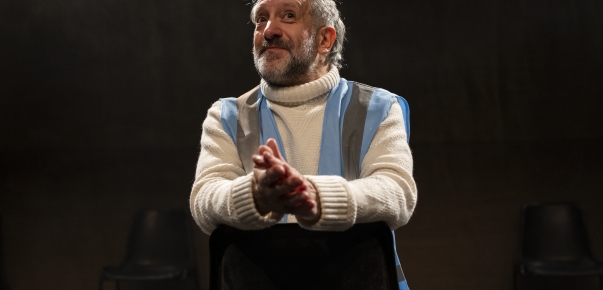Natalie McGrath talks about developing Coasting, playing in the Studio 22 Sep - 15 Oct
5 Jul 2011I think Coasting has always been waiting to burst out of me as a writer really. I grew up as a teenager in a British seaside town in the 1980s and knew this landscape, this world, it's etched all over me as an adult and after a very long time away I just wondered about it.
Unconsciously I started to write Ocean and Pearl after being set the challenge of writing for a weekend of play with two actors and a director at the Brewhouse in Taunton, way back in September 2007. Yes. I know, all that time ago.
Where are we now?! I only wrote two scenes - one set in an amusement arcade (now called Muzzy Sluts - which is what they are) and one set on the end of a pier entitled Ace of Hearts. Clacton-On-Sea (there I've outed myself from an Essex teenage life closet) has a pier and the end of it can be seen in the British film Kinky Boots. It's a massive open space and I imagined these two young adults having the freedom to roam this space. Hanging off its edges and looking out to sea whilst sea gulls swilled around and above them. Disrupting the peace. Their peace. Anyone who's ever lived in a coastal town will know how its metamorphosis from a fun and brightly lit space in the summer becomes something much darker as winter approaches helped me set the tone to a moment. The moment when this occurs.
This dark cloud hanging over set something about Coasting that hasn't shifted since I started writing it all that time ago. It also created a character and a relationship with a specific location that I hadn't done at that point as a writer. I was a bit new to it all at this point, but I knew that a focus on location could have me to discover something.
What I discovered was 'the Stretch', Ocean and Pearl's name for the seafront where they operated. It just emerged and seemed to fit. It was their world and that was what I wanted to write about and what would happen if it was challenged or disrupted.
I started to really play linguistically for the first time with Coasting, using a mix of Polari (a gay slang) and 80s pop lyrics (any excuse to indulge) that had resonance to create a kind of street language for Ocean and Pearl. I wanted them to have unique voices. I didn't know how else to write them to be honest with you. I stared for hours at pictures of Caravaggio's street people and knew it had some kind of connection to this world. So the two scenes were explored and presented and well received. I then didn't touch the play for over a year, maybe more. I did however write down what has become the opening line, 'Shake out the shiver of these dynamite bones', whilst I was on a bike one rainy day. Don't ask!
I wrote a version in 2009 for Hall for Cornwall's Beachcombing venture and it was very rough around the edges, but it gave me a chance to start to see what I might have.
Late 2009 Sharon Clark asked me if I had anything I would like to work on for January Ferment 2010. I posted her a copy of Coasting. She agreed to let me have a full reading of the piece and this was the beginning of the plays relationship with Bristol Old Vic. I was offered a cast and a director to work with over two days and to then present a reading on the 23rd of January, which is also my birthday. It was an incredible two days. From the moment of being welcomed in BOV by Sharon and Kate and meeting with the director, then meeting the actors and just working on the text to get it to some kind of presentable state. The reading went very well. Got some great feedback, but what so useful was being able to tune in to the audience as they listened in to this world and linguistic style I had created.
Ferment is so vital in this respect. It felt kind of electric and I was totally inspired to re-write the play (in order to now make it work theatrically) and really excavate the story and respond to the audiences feedback and the feedback from all who were involved. It totally challenged my engagement as a writer and how I thought about how I write.
From here I was offered dramaturgical support from Sharon who pushed me into keeping it simple (whilst asking probing questions) and finding the story as a vehicle to allow the language to breath and then we had a development week in June 2010.
The play got investigated rigorously and I wrote and re-wrote and tried things out. It was massive! We had a brilliant reading at the end of the week which helped me nail the play in the end. Along the way characters have emerged and then disappeared. This was very liberating and taught me about not being overly precious with my work!
I re-wrote again, all the time trying to get to simple truths. The ending bugged me the most and got re-written the most. I just wanted to write the best play I could. It was in a good state by the time I submitted it to Sharon in November I think.
In 2011 I met Sharon at Soho Theatre and she said to me "I think you should sit down" and that's when she told me that Bristol Old Vic wanted to produce Coasting. I was just a little bit excited.


